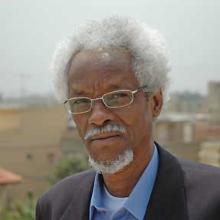Idriss Déby & Tainted Legacy: Chad is another Joke!
Even with great oil reserves, pumping about 140,000 barrels of oil per day, there is nothing to admire about Chad, one of the politically struggling countries on African continent! To understand the seriousness of the mess, compare notes with her unstable neighbors; Nigeria, Libya, Sudan, Central African Republic, Cameroon, and Niger (more on Niger). Just like Uganda (I am talking about Uganda because it’s where I am), Niger has never had a formal peaceful transfer of power. And now their president, Idriss Déby, has died, I mean, killed! Should we expect peaceful transition?
Idriss Déby and Infamous Rule (1990-2021)

Born on 18th June 1952, Idriss became Chadian president after a successful coup, ousting the then president, Hissène Habré, another tyrant who had been a ‘pain in the ass’ for Chadians since 1982! To give you a good picture, let us start this movie from when Chad got independence, 1960!
Chad scored her independence from France on ’11th August 1960 with the PPT’s [Chadian Progressive Party] leader, François Tombalbaye (June 1918-13th April 1975), an ethnic Sara, as its first president‘ (Wikipedia). Tombalbaye, the first president of Chad wasn’t an easy one too!
François Tombalbaye rule in Chad (1960-1975)
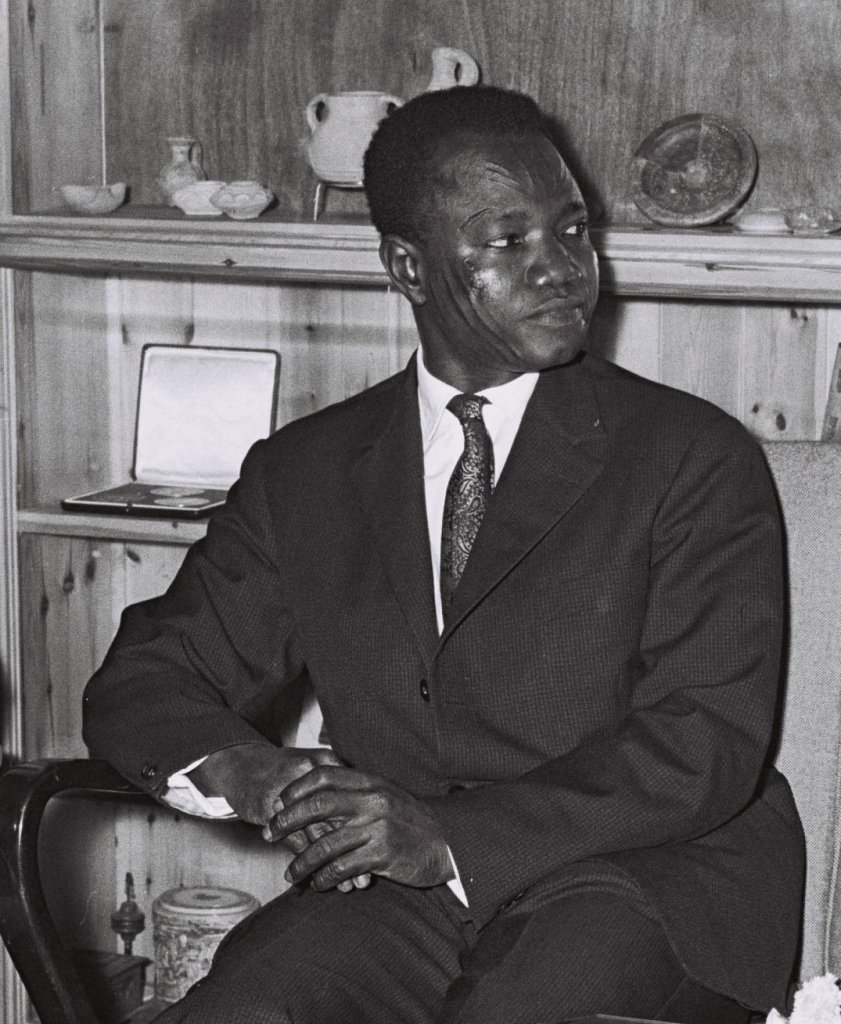
Soon after independence, Tombalbaye embarked on ‘nationalism’ ideology, which was about replacing French nationals with Chadians in various aspects of government. He also dissolved national assembly, banned all political parties and applied autocratic kind of leadership. To achieve his nationalism (or nationalization) goals, he imposed a national loan, increasing local tax. As with most African leaders, increasing tax wasn’t the problem, but corruption and favoritism! With increased corruption and taxation, protests erupted. In one episode of riots, the November 1, 1965 riots in Guéra prefecture, about 500 people were killed. Like most African dictators, Tombalbaye couldn’t tolerate opposition, forcing many of them out! Well, with involvement of Libya and Sudan, many insurgent groups were born, the best of all being FROLINAT (Front de libération nationale du Tchad or National Liberation Front of Chad).
The threat became real. The dictator got scared. To deal with this, Tombalbaye sought help from France. France agreed to get involved only if Tombalbaye made some reforms (reduce taxes, stop corruption and favoritism, and allow for tax collectors, the sultans, to return to their job, and more). He nodded yes! Many political prisoners were released and serious changes made. However, this didn’t help.
Later, when French troops withdrew, Idriss Déby, inspired by Mobutu Sese Seko, continued his campaigns of ‘Africanization’ (buying elites’ support with positions, bribes, city and place names) or nationalization. The unrest continued. Just like most African leaders, he responded to all sorts of riots, demonstrations, and or opposition (both real and imagined ones) with extreme force; killings, arrests and detention, and so much more. He dissolved his own party renaming it the National Movement for the Cultural and Social Revolution (MNRCS), arrested and detained many politicians, including fellow members of his party, for example, Malloum, and severed ties with Arab world, including his neighbors, Libya inclusive.
Read more from Thoughts and Opinions
In the end, ‘on April 13, 1975, after some of the country’s leading officers had been arrested for involvement in an alleged coup, a group of soldiers killed Tombalbaye and secretly buried his body in Faya. The military installed Félix Malloum, by then a general, as the new head of state‘ (Wikpiedia). Better details of Chadian Civil War can be found here.
Félix Malloum rule in Chad (1975-1979
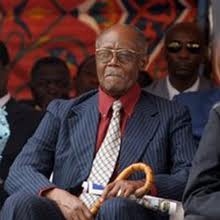
This guy was basically the ‘better one’; went to French academy, became a politician (under PPT party) and army officer, scoring the position of Chief Commander of Chadian Army forces by 1972. In 1973, he was arrested by his president, Tombalbaye, on charges of conspiring against the government and using witchcraft to fail Tombalbaye’s good times. Well, with all other issues considered, a coup was organized and successfully executed in 1975, making the guy a president of the new government. Wait! Not a president alone, but also a prime minister! So, how did he rule and or end?
His rule was fairly better than Tombalbaye’s. First, he overruled most of the former president’s laws, including the terrible laws about ‘forced’ cotton growing, taxation, favoritism and more. With promises of forgiveness, positions in government, and more, he convinced most rebel groups to return home and join the national force. Though some groups resisted this offer (for example, the rebel group under Goukouni Oueddei), many returned, including Hissène Habré, who was offered the position of Prime Minister in 1978.
However, even with all his efforts, he couldn’t buy everyone, especially the elites or capitalists. Besides, traces of corruption, failure of his people to administer services successfully, and more couldn’t suppress rebel campaigns. Additionally, some political situations (for example, the abduction of French nationals or archeologists by rebels, and the consequent non-productive negotiations between Malloum’s government and the rebels and expulsion of French nationals) worsened his government’s relations with France, Libya, and the rebels, compounding the situation. Libya continued its support of rebels, compelling Malloum into more disastrous decisions, and failure of his a ‘little’ bit dictatorial government to deliver to the public that had ‘high’ expectations.
And this is where his wisdom came in. According to New York Times, in 1979, March 23rd, the gentleman resigned, and sought safety in Nigeria. He returned home 23 years later in 2002, and was entitled to all offers accorded to former presidents. He lived his life until June 12th 2009 when he died of cardiac arrest in an American hospital in Paris, France at age of 76. Can we say that this was a peaceful transition? Yes and No! Why?
According to a report by Reuters, the answer is yes, because, instead of fueling fights and seeing more destruction of people and property, the wise president (and his prime minister) decided to give up their positions in exchange for cease-fire or peace. And no, simply because war or violence forced the president into corner. Left with no better options, resignation became unavoidable! Additionally, earlier, some assassination attempts had been made on his life as well, probably injecting the thoughts of resigning into his mind!
However, in my view, this is my hero, the true hero of Chad; the guy who resigned when he saw it more benevolent and helpful. President Félix Malloum Ngakoutou Bey-Ndi. More about Malloum’s rule in Chad, see here
Should I go on?
Goukouni Oueddei and his rule of Chad (1979-1982)
Of course, when Malloum resigned, the leader of rebels, Goukouni Oueddei, took over the new government (Transitional Government of National Unity-GUNT) that was meant to unite the northerners and southerners. Hissène Habré returned as a Minister of Defense in this new government. In general, Goukouni Oueddei was viewed as a puppet of Libya and this created serious tensions between him and Hissène Habré, a pro-West northerner.
Shortly, in 1980, Hissène Habré broke away from everything the new government, GUNT, stood for and formed a rebel group, the Armed Forces of the North (AFN), which fought against Goukouni’s government for about 9 good years. Of course, Libya and her Qaddafi came in with about 7,000 troops and machinery to support their ‘puppet’. Well, Habré lost to the guys! In 1981, Goukouni and Qaddafi made a plan to add Chad to Libya, waking up USA into the war. Then then president of USA, Reagan, decided it was time to control Qaddafi’s power, and ‘bloody his nose’, Human Rights Watch cites the Secret Wars of CIA, a book by Bob Woodward (see his website here)
Well, by 1982 on June 7th, the rebels of AFN under their leader Hissène Habré and supported by USA’s president Reagan seized Chad’s capital, N’Djaména, ending Goukouni’s rule. He escaped into Libya for safety. As of now, 22/04/2021, the guy is still alive!
The rule of Hissène Habré of Chad (1982-1990)
Habre’s rule was one of the worst! With support from USA and France, he took up power in 1982. His rule was about revenge, and torturing opposition. According to a profile by BBC, the guy created a unique police force, the Documentation and Security Directorate (DDS), that arrested, tortured, and killed those he thought were against him. According to a report by Human Rights Watch, Habre took on various ethnic groups (ethnic cleansing), for example, ‘Sara (1983-84), Chadian Arabs, the Hadjerai (1987), and the Zaghawa (1989-90), killing and arresting group members’ and their leaders as long as he perceived them dangerous to his regime. In fact, insists the report, the total number of his victims can’t be known!

A detailed commission report (pdf here) on Habre shows that his political police whose directors were family members and or from same ethnic group and reported directly to him (DDS) would torture the opponents by burning their bodies with incandescent objects, spraying gas into their ears, eyes, and nose, forced swallowing of water, and forcing their mouths on exhaust pipes of running cars. And, of course, ethnic cleansing!
According to DDS files recovered by Human Rights Watch, thousands of people (more than 40,000) died and more than 200,000 were tortured. The guy was also a chief of corruption, embezzlement, and favoritism. He was accused of having stolen between 5.9m-11m USD in just one day before his escape to Senegal. Actually, the total amount he stole throughout his rule can’t be ascertained. He was later named the Africa’s Pinochet, the notorious Chile’s dictator who ruled between 1973 and 1990.
With this kind of leadership, the guy became unpopular. In 1990, he was overthrown by Idriss Déby, the Chad’s president who was killed yesterday.
The Pinochet of Africa escaped into Senegal where he lived his life peacefully; found himself new friends in a local Tijaniyya Islamic sect, married and produced 4 children, and would go for his prayers on Friday as usual. For him, life was normal, until his ‘sins’ and voices of his victims caught up with him.
According to BBC report, his victims started asking for justice long time ago. However, Senegal never cared. Then, victims turned to Belgium. Belgium responded, and an arrest warrant was signed in 2005. Well, Senegal put the guy under house arrest but didn’t do any other thing about it, citing excuses of trial funding and more. ‘Four extradition requests from Belgium were denied and the African Union (AU) urged Senegal to prosecute Habre “on behalf of Africa”‘ (BBC).
Well, Senegal said yes (2008), but later (2011) changed her position and accepted repatriation of the suspect back to his home, Chad. UN stopped this plan, citing that the guy might not survive in his country, Chad. In 2012, the international court (Hague) ordered Senegal to either do the trial or send the suspect to Belgium for trial. ‘A month later, Senegal and the AU signed a deal to set up a special tribunal to try the former leader’ (BBC). That is how the former leader of Chad, Hissène Habré, got tried (between 2015 and 2016) in AU-supported court in Senegal, getting convicted in 2016 and sentenced for life imprisonment! Justice served.
The rule of Idriss Déby Itno (1990-2021)
This guy is the whole reason I wrote this article. All the above has been about me showing you that Chad, just like most African countries, is another joke! In this country, peace, justice, and normal transition of power is a myth, something we still have to dream about, just in dreams!
As already noted, Idriss came to power by force in 1990, ousting the then president of Chad, Hissène Habré. Born on 18th June 1952 to a ‘poor’ herder among the Bidayat clan of the Zaghawa ethnic community, Idriss (I prefer Idriss to Déby because I want to dodge the special character é) attended various schools in Chad until his first bachelor’s degree in science. He then trained in military (officers’ school) at home, and later got blessed with an opportunity to go to France and studied ‘piloting’, returning home in 1979.
Well, as already noted, since independence, the country of Chad was a battlefield! Idriss remained loyal to the army and the government (both of Malloum of 1979s and of Habré’s 1982). And so in 1980s, exactly 1 year after Hissène Habré became president, Idriss was made commander-in-chief of the army. He performed well and pleased his boss. In 1985, Habré sent Idriss to France for further studies, returned in 1986, and was made chief military advisor to the president. He also had some victorious battles against pro-Libyan forces or rebels in Eastern Chad.
In 1989, Idriss and the president had some disagreements regarding the extent of power or authority of presidential guards. Idriss was later accused of a conspiracy or coup by his president, Habré, forcing him into Libya through Sudan for safety. Fellow other suspects, including the then minister of interior, Mahamat Itno, and commander-in-chief, Hassan Djamous, were killed. Well, Habré went ahead and targeted Zaghawa ethnic group, killing and torturing many, part of the reason he is behind bars right now serving a life time sentence.
On the other hand, in 1989, Idriss relocated from Libya to Sudan, forming a rebel group, the Patriotic Salvation Movement. With support from Libya and Sudan, Idriss Déby kept launching assaults on Habré’s government. In his final assault, on 2nd December 1990, Idriss Déby’s army, MPS, marched unopposed into the city, N’Djamena, successfully ousting president Habré with his close officials and army into exile, Cameroon. The coup was successful.
On personal life, Idriss is said to have married several times, and has had at least a dozen children. In 2005, he married Hinda, and decorated her the first lady. One of Idriss’ sons, Brahim Déby, was once a civil servant in his father’s government (senior presidential advisor), but was later sacked due to ill-manners, including unlawful possession of weapons and drugs. In 2007, he was found dead outside his apartment in Paris, France.
Idriss Déby, the Chad’s hope and revolutionist (1990-2021)!
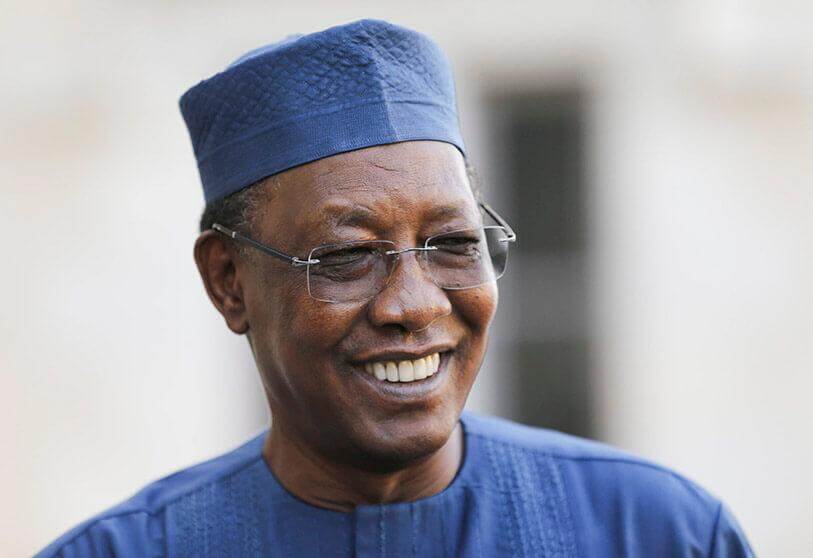
Idriss Déby came in as a revolutionist and savior. His triumph was greeted with excitement. Without thwarting people’s excitement, Idriss Déby promised new reforms and democracy. According to Helga Dickow, author at The Conversation, ‘Déby’s reforms were greeted with great relief. For the first time political parties and a free press could be established, and six years after he came to power Chadians voted for a new constitution in a referendum’.
Wait! A referendum? Let us digest this a little. According to a 2008 analysis by Patrick Berg (pdf here), all that Idriss promised soon after power capture were lies, rhetoric speech for public consumption as he armed himself for all he had to do!
For example, argues the paper, the promise for multi-party system didn’t happen until the end of 1991. Even though he set up a commission to investigate the Habré’s crimes and abolished the former president’s political police, DDS, the recommendations of the commission, published in 1992, were largely ignored. Additionally, continues Berg (2008), more power, money, jobs, and ministerial positions were awarded to only those of his ethnic group, the Zaghawa. As a sign of people’s intolerance of his violence, Idriss experienced about 3 attempted coups between October 1991 and June 1992. Just like all dictators do, his reaction was fierce; arbitrary arrests, torture and execution of real and imaginary enemies.
The referendum or majority support for the 1996 constitution wasn’t even a big deal. Critics say that, first and foremost, the constitution was drafted without any consultations. No wonder the constitutions did less to secure public’s interests and more to give more power to the president.
For example, argues Berg (2008), the constitution gave the president authority over the Prime Minister (head of government) and Judiciary (in charge of justice); he could appoint and or ‘disappoint’ these positions as he wished! Consequently, citing this manipulation of the constitution, opposition members whose suggestions for change had been ignored refused to participate in the referendum and, of course, rejected the majority vote or support or referendum results for the constitution. Anyway, the government went ahead; forged the constitution, passed it through the referendum (3rd March 1996), and held the first multi-party general elections (2nd June and 3rd July, 1996).
Idriss emerged as the winner of the elections, the rigged elections! (Berg, 2008; Nohlen et al., 1999; get the book here). In 2001, more elections happened; Idriss Déby ‘seemingly’ won! Many were already tired with the ‘fake’ elections in which opposition was heavily harassed and elections rigged! Rebel groups were seriously fighting his government. As a matter of fact, in 2005, there was an attempted coup in which Idriss plane was shot. According to Berg (2008), the opposition and civil society in Chad seemed disorganized as well and this gave Idriss all the opportunity to manipulate them.
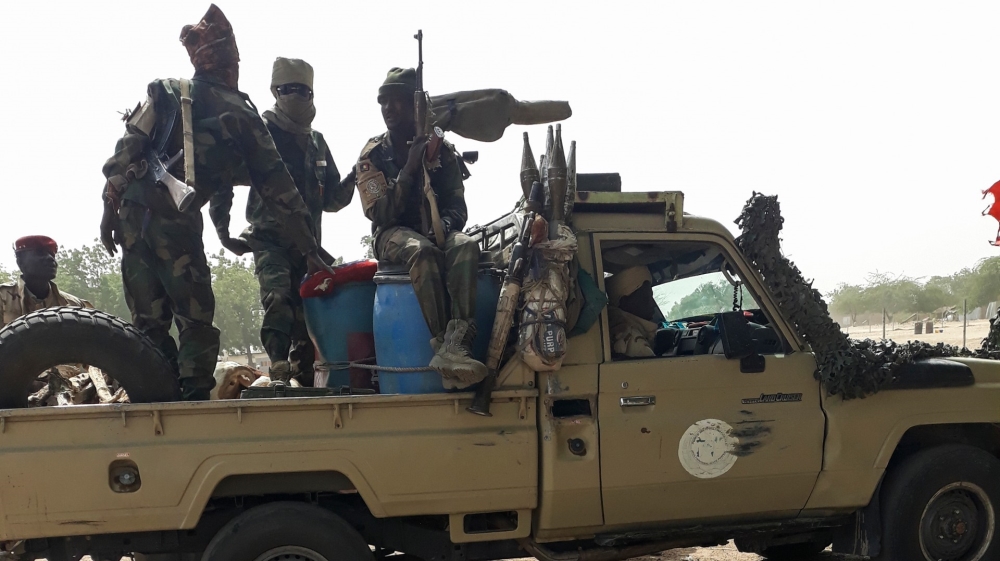
Towards the 2006 elections, the opposition demanded for some reforms, which Idriss’ government refused. Instead, to create the possibility of third term, Idriss and his guys proposed constitution amendment to scrap off term limits. Opposition and general public refused and boycotted participation. But the powerful man passed the amendment through a referendum in June 2005, giving him a chance for re-election. Despite everything else, Idriss Déby organized for the 2006 elections, which happened on 3rd May 2006, participated in them almost alone (main opposition saw no need of participating), and, of course, won! He was sworn in for the 3rd term on 8th August 2006.
Insurgency increased but Idriss was determined. In fact, the 2006 and 2008 rebel attacks could successfully go as far as the capital, but Chad, with some foreign help or even without would repel the invasions! First, notes Berg (2008), the opposition is divided and the rebel groups are always fighting each other, each wanting to enthrone its own ethnic king! The civil society is powerless, with no clear intention or motivation for political dialogue. Idriss took advantage of this. He would negotiate with some rebels and provide their leader a position, one by one. But many remained immovable! With support from Sudan and or Libya, more coups were attempted but in vain. His presidency was characterized by constant wars against various rebel groups.
The country had more elections in 2011, 2016, and 2021, with Idriss emerging as a winner! In all these elections, the incumbent Idriss would threaten, detain, and kill opponents, scaring most opposition voters out of the struggle, making strong opposition leaders give up on participating, and, exercising fraud of the highest order.
To be exact, for the May 2011 elections, reported a South African news agency, two main opposition candidates withdrew from the elections in addition to many more employees of electoral commission who had resigned, citing Idriss’ violence and poor handling of elections, further scrapping off any credibility to the elections. In 2016 April 10th elections, an opposition leader was stopped from participating, serious riots occurred across the city, further revealing that Idriss was simply voting himself into power! On the election day and days thereafter, internet, mobile SMS, TVs, especially of foreign agencies were all blocked, halting all forms of communication and transparency, and allowing Idriss to be voted into power in ‘peace’! In fact, Chad blocked social media access for more than a year!
For the recent 11th April 2021 elections, the story was the same or worse. Campaigns were characterized by intimidation, raids on opposition, and, according to many reports, killings. For example, the government is said to have raided one of the opposition leaders’ home, killing his mother, son, and other relatives. Many major opposition candidates withdrew their candidacy and didn’t participate. Others got scared out of it. And indeed many people lost their lives.
Indeed, of the 16 candidates, only 6, mostly the staggering weak opposition candidates, appeared on the ballot paper. Exactly like it happened in Uganda, Chad government used COVID19 excuse and cracked down all opposition gatherings! Anyway, Idriss had the elections and won (or was expected to win) his 6th term amidst all complaints and protests and, of course, rebel advances!
The unexpected death of Idriss Déby!

Before he could be announced winner & sworn in, Idriss participated in one of his army’s war campaigns against the rebels called FACT (Front for Change and Concord in Chad). Unfortunately (or fortunately, his victims would say), he was shot by the rebels while on front-line, succumbing to the injuries and breathing his last on 20th April 2021.
Soon after his death, his son, the 37-year-old four-star general, Mahamat Idriss Deby, led a military council and took over Chadian leadership, basically seizing power from the public or the country’s constitution that had it stated clearly that, should a president die or have other issues befall him, the chairman of national assembly (that is, the speaker of parliament) or, should that fail, the vice president becomes the president for about 90 days, and then general elections! In other words, the son has already executed a coup, dissolving both the constitution and parliament!
In the new update reported by Daily Monitor (22/04/2021), Mahamat and his military council have made some changes in their earlier decisions, re-instating some of the ministers who had been in the former government. Daily monitor says, ‘it is not known why this turnaround, just a day after these steps were taken’. However, a brief observation of the matter shows that it is because, under the current rebel attacks and pressure, effecting too many changes can be detrimental. The guy took over presidency and is simply setting himself up for the bigger fights! Having former ministers continue their work may not the most pressing issue now!
His death was seen by some, especially fellow African dictators as a loss. Additionally, the west, especially USA and France expressed condolences since Idriss had been a great figure in the fight against Islamic terrorism! Read here about the world’s reaction to Idriss’ death! However, to many others, including the victimized opposition at home and the rebels, his death is a blessing in disguise, ushering in a new wave, a hope of possible change! For example, according to Daily Monitor, US news, and Africa news, the rebels, FACT vowed to continue marching to the country’s capital. In one report, the FACT leader is quoted saying:
“Chad is not a monarchy. There can be no dynastic devolution of power in our country. The forces of the Front for Change and Concord are heading toward N’Djaména at this very moment. With confidence, but above all with courage and determination.” (US News)
Idriss Déby and Chad’s Socioeconomic Development

On the other hand, in 2000s, Chad (helped by World Bank) started her work on oil pipeline, the Chad-Cameroon Petroleum Development Project, the project that was to ensure socioeconomic transformation of Chadians using revenues from their oil. Besides oil, cotton is the chief export! As always, even with few measures in place to guard people’s interests in oil industry, Idriss managed to misuse the little money from the oil. Instead of developing hospitals, schools, and infrastructure as had been designated, Idriss Déby used the money to buy weapons, army helicopters, and consolidated his power! Helga Dickow at The Conversation writes:
“Part of the oil revenues went into strengthening the military and security forces. This enabled Déby to become a loyal ally of the French army on the Sahel battlefields against Islamist terrorism. Déby successfully defeated rebel attacks in 2006, 2008 and 2019. This was in no small part due to his own capacities as a good military and political strategist as well as the loyalty and support of the French government”
His wife, Hinda Déby Itno, a daughter of Mahamat and Mariam Abderahim Acyl, controls the country’s oil resources through strategic distribution of influential positions among relatives. An article by Africa Intelligence explores how oil, Chad’s major source of wealth, is simply a family business!
With oil flowing, and international support through IMF, World Bank, and other endeavors, Chad still has nothing great to show off! The country is one of the poorest in the world, almost the last on UNDP’s Human Development Index at 187/189 countries, the last one being Niger. The maternal mortality ratio is as high as 856 per 100,000 live births in a country of a little more than 16 million people! The country performs terribly on more other indexes. For example, Chad is worst on corruption, 7th on the list of failed states, and more than 42% of the population (more than 6.5m people) are below poverty line!
Nevertheless, it is only during Idriss that the country registered some progress in almost all sectors, except transparency and corruption. In 2016, he was voted as the chairman of AU and replaced Zimbabwe’s Robert Mugabe. In his inauguration speech, he insisted that insurgency was to be dealt with either through peace or war.
Militarily, the country became a little stronger defending itself against the countless rebel attacks, protecting Idriss’ power for the last 30 years. Apparently, the country was able to spare some strengths to be borrowed. For example, as has already been hinted on, Chad has greatly participated in anti-terrorism efforts across Africa (Sahel) by sending her troops on peace missions and controlling Boko Haram, a contribution that is greatly recognized internationally. Some reports say it is this central role that made USA, France, and many other African leaders ignore all other atrocities committed by Idriss’ regime against humanity!
What’s next for Chad after Idriss Déby Death?
In my opinion, Chad is still far away from peace. Déby was a dictator who cared less about putting up institutions and enabling others to lead, but only proclaimed and promoted his family circles. While he indeed tried some developmental moves for his country, there is no sustainability plan. His legacy is now a tainted one!
First, his death will likely cause a security-related shift in Sahel, where Chadian troops had been helping ward off Islamic terrorists, including the Boko-haram. Secondly, the Chadian rebels who have killed him have all the reasons to advance their cause. Reports indicate that they have no intentions of stopping, except for few hours to allow for mourning! Without the ruthless effort of this charismatic Chadian leader, suppressing rebels may not be simple for his son. Thirdly, the son’s dissolution of parliament and consequent ‘raping’ of the constitution has already created new powerful enemies and taken a way a part of the public’s trust or support, further complicating issues for the interim government. So, what’s next for Chad? I see mess, only a mess of issues!
Chad & Uganda: Idriss Déby and Tibuhaburwa Museveni!
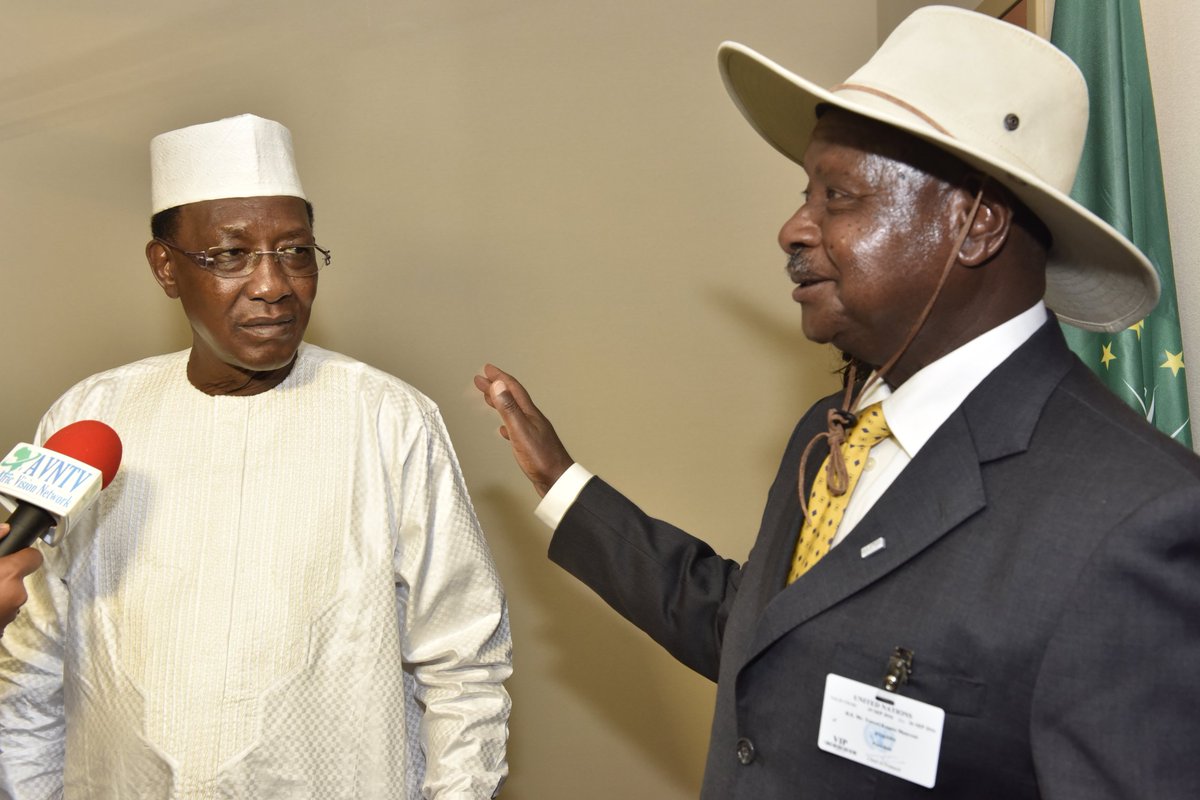
In my opinion, politically, Chad and Uganda have a lot more in common than differences. Just like Chad, Uganda has never seen a peaceful transition of power since Independence.
Uganda got her independence on 9th October 1962, 2 years after Chad had secured hers. Well, the days that followed were just violence. To begin with, Apollo Milton Obote (28th December 1925-10th October 2005) seized power during the Buganda crisis and declared himself the president (1966-1971). Idi Amin, Obote’s army chief, toppled off his boss in a successful coup in 1971. Idi Amin, as far as I know, is our Pinochet! His rule (1971-1979) was characterized by brutal arrests and killings, favoritism, and plundering of economy.
Well, in 1979, Amin was ousted by Uganda rebels, Uganda National Liberation Front (UNLF) with big support from Tanzania. In fact, it is even fair to say this was more about Tanzania and Uganda than Ugandan rebels and Uganda. While versions of this war differ, it is greatly believed that Amin’s desire and annexation of Kagera, a Tanzanian territory, onto Uganda intensified the tensions, necessitating the war. Amin escaped to Libya, then to Iraq, finally settling in Saudi Arabia. He died of kidney failure in 2003 while in exile! Well, UNLF took over Uganda when, in reality, it wasn’t prepared. Soon after the take over, various disagreements and conflicts erupted among themselves (UNLF and Ugandans), creating different rebel sects, culminating into the 1980-1986 bush war!
Read this too: Maliyamungu and his killings, Idi Amin’s Right Hand Man!
What have I said? Well, to be exact, this is what happened: After UNLF/A capture of power in 1980, an interim commission was put up. The purpose was to take control of the country’s leadership as general elections were being organized. The then chairman, Paul Muwanga, together with other two commission leaders, Yusuf Lule and Gdfrey Binaisa, supposed took over the presidential duties. On 10th and 11th December, 1980, Uganda had her first post-independence elections. Obote’s UPC won. Others, including Yoweri Museveni claimed he (Obote) had rigged elections, thereby defecting to start new rebel groups and attacks (the bush war) on Obote’s government. More about Obote, read his own account (here or here)
Few years later, 12th July 1985, Obote was ousted by his own military officers (Brigadier Bazilio Olara-Okello and General Tito Okello) in a successful coup. The two guys immediately put a military council with Tito Okello as the interim leader or president. However, during their first two chaotic months, Museveni and his NRA men were closing in. The interim government led by Tito Okello tried negotiations with NRA rebels, but the rebels refused to compromise, launching more offensive attacks in western and southern Uganda (August-Dcember 1985). In January 1986, between 17 and 26th, NRA attacked Kampala and successfully took over power, instilling Museveni as the new president! Obote and the two Okellos escaped into exile. To be precise, Obote escaped to Zambia through Kenya, only to die of Kidney failure in 2005 in South Africa while still in exile!
From 1986 to about a decade later, Museveni was hustling with rebel groups, especially in the north, including the Alice Lakwena’s spirit movement, Lord’s Resistance Army, ADF, and more.
However, with almost similar tactics, Museveni just like his counterpart or contemporary leader, Idriss, managed to negotiate out and compromise enemies, one by one, promising them pardon, positions, and money, grabbed the whole of the country’s wealth and invested it in military and family circles, opened up for ‘pseudo’ multi-party system, but kept the opposition at bay through intimidation, arrests, torture and killings, and confused the west by heavily providing for their appetites through anti-terrorism support in Somalia, South Sudan, and elsewhere, amended the constitution (twice), scrapping off term and age limits, and has successfully organized, participated and won elections in 1996, 2001, 2006, 2011, 2016, and 2021.
Like his fellow, Museveni organizes elections and, at least according to opposition claims and observers’ reports, votes himself in! Most elections in Uganda are characterized by violence, intimidation, arrests, disqualification, closure of internet and blocking of social media, and more other similar irregularities. Public demonstrations and riots are responded to in the same way Idriss responded to them; brutal force and killings, followed by clandestine abductions, torture, and killings of those posed to be threats! In all of this, where don’t you see similarities? Nowhere, except this; socioeconomic development!
Socioeconomically, Uganda has fairly progressed under Museveni than Chad did under Idriss. Though there could be factors or contextual reasons for these differences, leaving other factors constant, we need to appreciate them! In general, Chad is still far away in terms of education, health, infrastructure (for example, by 2004, Chad had only 550 km of paved roads), industries, air, water, and railway transport. On the other hand, while Uganda has its own share of troubles, it has steadily progressed under President Museveni’s regime.
On UNDP’s development index, Uganda is at 159/189 (better) and Chad is at 187/189 (bad). On the list of failed states, Uganda is at 24 (better) and Chad at 7 (bad). In terms of education, by 2002, Uganda’s literacy rate had shot up to about 66.8%. For Chad, more than 50% of the population are illiterate. A 2012 world bank document reported 33% literate rate! On other important indexes, for example, health, energy, water and sanitation, telecommunication, internet, science and technology, and more, Uganda is basically a progressive country though with hiccups here and there. However, for Chad, the road is still long! In all of this, I would love to look into corruption and rule of law a little deeper!
Corruption, Rural of Law, Human Rights in Uganda and Chad
On the corruption index, Uganda is at 142 (good) with fellows like Angola. On the other hand, Chad is at 160 (bad) with friends like Cambodia, Eritrea, and Iraq. On human rights and rural of law, I basically see no differences. In Chad, human rights violations in form of arrests and tortures, restrictions on press and freedom of speech, and violence especially in elections have been normalized. As already noted, since independence, the country knows no peaceful transition of power, implying internal violence and displacement of persons. Media and human rights organizations’ reports have implicated Chad and her leader, Idriss, in a number of human rights violations for a long time. The same is true or even worse for Uganda. All media reports and special reports by American Embassy in Uganda, Human Rights Watch, Amnesty International, and more indicate that Uganda is harsh on free press, especially social media, opposition, and individual rights. Since 2014, Uganda has been regarded as a ‘Not Free’ state by Freedom House (see the 2020 report here). Reports of torture, arrests, killings, disappearance, and more have been reported!
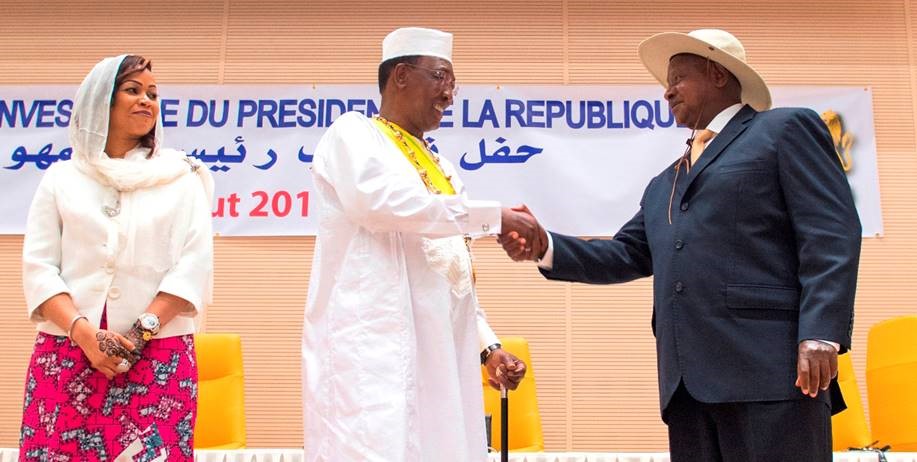
Final Verdict: In summary, while Uganda and Chad greatly differ in terms of socioeconomic development, they are in many ways similar in terms of politics. In both countries, politics and elections are still crude, involving a lot of crackdown on opposition, rigging and fraud, and suspension of communication, especially internet and media. The question is, how do countries so similar in political set-up differ so greatly in socioeconomic development? Don’t politics affect economy? What are we missing?
Well, in my view, even in politics, there are some marked differences. For example, while Chad is still in wars, Uganda has been relatively stable for the past 20 and more years, only experiencing few internal violence here and there. This gave Museveni time to concentrate on development. Additionally, the opposition in Uganda (let me give credit) seems to be a little ‘developed’ or learned and rarely pick up guns to raise up their voices, something totally different with Chad. Uganda’s neighbors are stable as well, influencing economic progress.
While there is general crackdown on opposition, in my view again, this crackdown doesn’t generally go down to a common person. If a person didn’t get involved in politics deeply, and instead focused on his socioeconomic survival, there are some isolated opportunities for growth in Uganda, enabled by developed energy, transport, internet and technology, and the heavily growing population of more than 42 million compared to Chad’s 16 million people.
However, with everything in its place, and leaving all other factors untouched, Chad and Uganda are similar and look like most other African nations. Idriss Déby might have worked so hard to bring Chad to where it was or is, but his way of doing things didn’t consider sustainability of such efforts. In the end, just like most African leaders, including Museveni, Qadaffi, Mobutu, and others, his legacy is a tainted one. And because of his poor and brutal methodology, people are likely to remember him a lot more for his evil deeds than his sacrificial contributions to Chad’s socioeconomic development.
In my final verdict, Chad, just like her sister African countries, is a big joke!
READ THIS TOO: Is Mugisha Muntu Indeed the Change You Can Trust?

